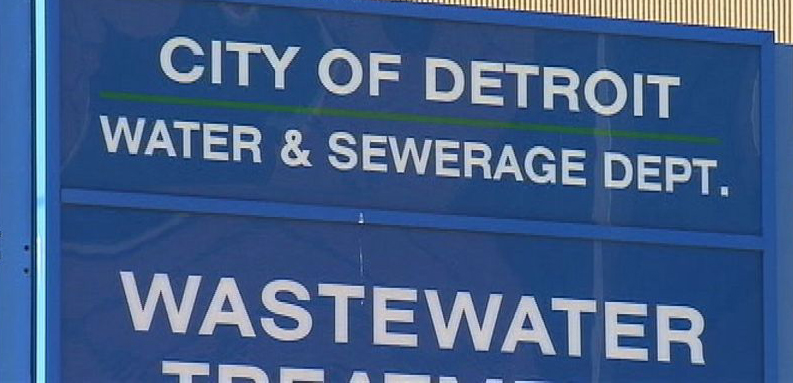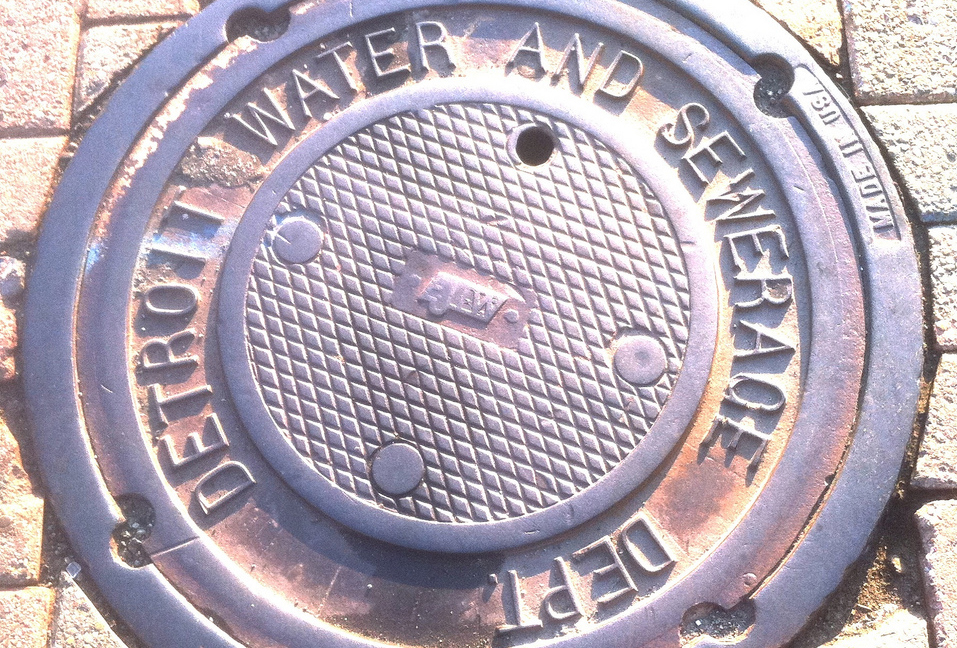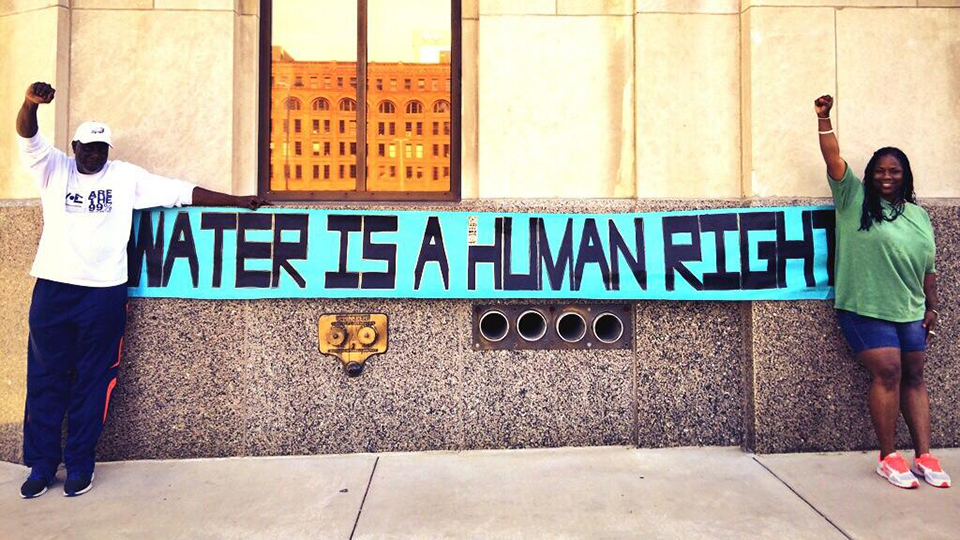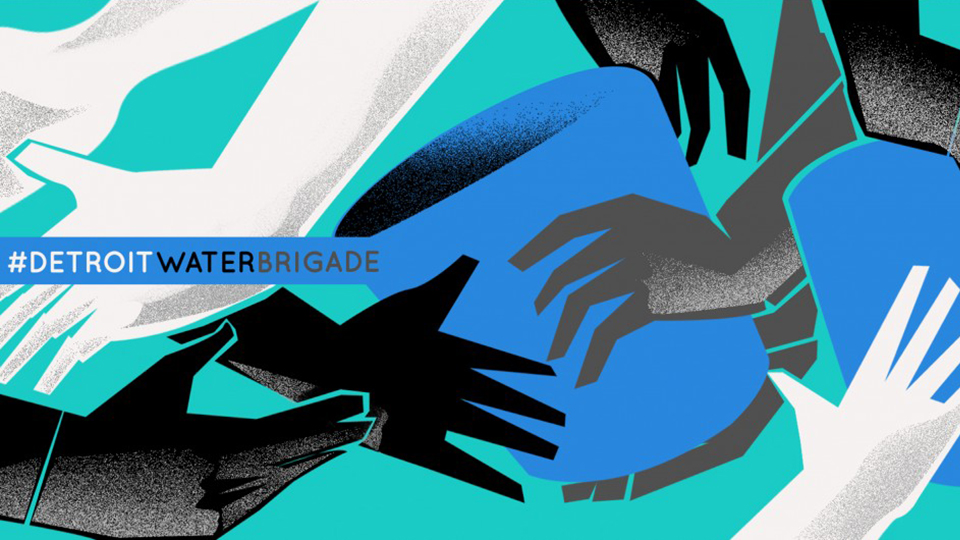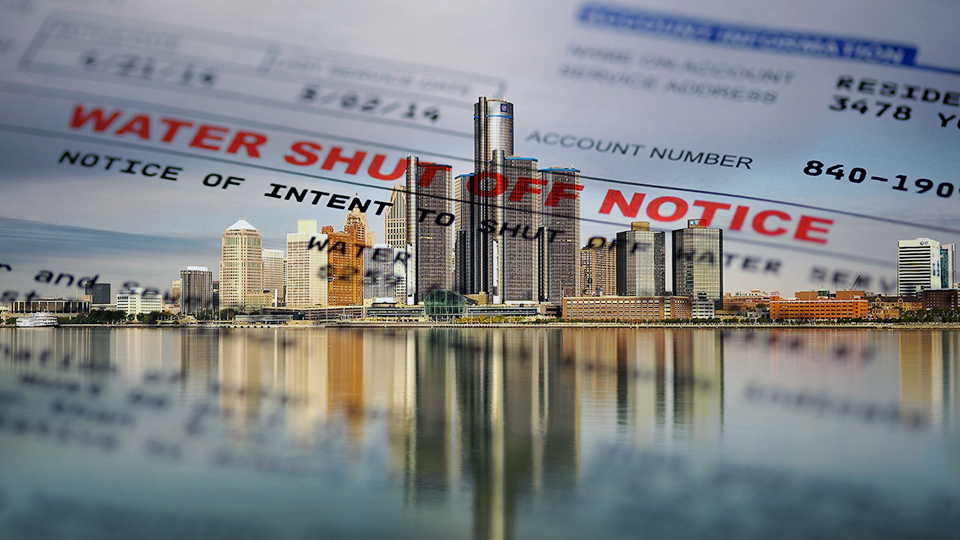“Your human dignity shouldn’t be truncated because you’re priced out of the commodification of an essential resource.“ - Charity Hicks
At 6:45 on Thursday morning, the Reverend Bill Wylie-Kellerman of St. Peter’s Episcopal Church in Detroit sat down with nine othersblocking the entrance of the facility where Homrich Wrecking’s water shutoff trucks were set to leave for the day. By 8 a.m., the “Detroit Water 10” had been charged with disorderly conduct with bail set at $100 apiece. The goal of the protest was to appeal to Homrich contractors to stop shutting off water for Detroit’s poorest residents.
“The officers had bruised up two elderly ladies who were tied together protesting; they were grabbing their arms and their wrists so hard there were bruises on their wrists,” said DeMeeko Williams, an organizer with the Detroit Water Brigade. “They also pulled one of our handicapped men out of his wheelchair, he was out of the chair and on the ground. That’s abuse, I don’t care what anybody says.”
Approximately 12,000 Detroit residents have already had their water turned off since Detroit Emergency Manager Kevyn Orr announced the plan in spring to shut off homes delinquent on water payments of $150 to $160. UN resolution 64/292 declares that water and sanitation are basic human rights. After Detroit activists appealed to the United Nations, the UN declared the water shutoffs in Detroit were a violation of human rights.
Williams says denying a basic human right like water to a major portion of the population also creates a public health crisis.
“When people go without water there’s a lot of diseases, salmonella, poor sanitation, when you can’t flush your toilet... it's just an outbreak waiting to happen,” Williams said.
As reported in an earlier piece for Occupy.com, Kevyn Orr is one of several emergency managers appointed directly by Michigan Gov. Rick Snyder to make financial decisions on behalf of communities deemed to be in a state of fiscal emergency. The communities in which an unelected emergency manager has been appointed are overwhelmingly poor and black.
Michigan’s original emergency manager law was rejected by voters in a 2012 referendum. But the Republican-led legislature passed a new version into law shortly after, adding in language that says the law can’t be repealed by another voter referendum. The current emergency manager law is being challenged in federal court on constitutional grounds.
The Bigger Picture of the Water Crisis: Privatization
The water shutoffs in Detroit, which is currently in the middle of a bankruptcy fight, are merely a prelude to the outright privatization of water and other public assets. Defenders of Kevyn Orr’s water shutoffs claim that residents need to simply pay their bills to avoid losing their water. Others argue that water infrastructure needs to be paid for – and if it isn’t, the only logical conclusion is that those who don’t pay for the infrastructure will lose their water.
But those arguments don’t take into account how municipal water is priced. Since the Clean Water Act of 1972, public water has been allocated on a uniform unit pricing scheme. This means big corporate clients like the Palmer Park Golf Club, which owes over $250,000 in water payments, pay higher rates for water while residential customers in Detroit pay a lower rate. About 80 percent of the bad water debt is owed by Detroit Water and Sewage Department's corporate customers.
The uniform unit pricing scheme, however, doesn’t allow different rates for residential customers with vastly different incomes. So in poorer cities like Detroit – where globalization, union busting and the housing market collapse decimated the economy and left thousands jobless – poor communities pay regressively higher rates for water.
In the 42 years since the passage of the Clean Water Act, federal funding for municipal water has dropped by 80 percent. Local governments paid over $111 billion in 2010 alone for water delivery. Without increased federal funding, water will only become more expensive for poor residents of large cities like Detroit, paving the way for privatization.
According to Williams, United Water – a company based in New Jersey, and owned by multinational giant Suez Environnement – is already preparing to make a bid on Detroit’s water infrastructure, which Kevyn Orr would be prepared to accept in return for $47 million in annual payments over 40 years from the private water companies. Such a privatization plan would lead to the creation of the Great Lakes Regional Authority to manage all Detroit Water and Sewage Department infrastructure, making the entire city a customer of the water authority. Williams believes if that plan were to go through, the next step would be to privatize the Detroit River and the Great Lakes.
“We want to stop the privatization of the water department so it remain as a public commons,” Williams said. “It’s a very dangerous precedent to cut off people’s water and not give them any sort of reconciliation or negotiation.”
Williams and others are calling on the City of Detroit to halt all water shutoffs and reinstate the Water Affordability Plan that Gov. Snyder overturned in 2010. On July 18, Detroit activists and thousands of attendees at the annual Netroots Nation conference will join together downtown to protest the water shut offs.
“This all would have been avoided had the Detroit Water and Sewage Department held a community meeting or public event to settle with Detroiters,” Williams said. “We’re trying to really help folks out. We let people know that this is not their fault – but this will be their fight."
This article is dedicated to the memory of Charity Hicks, a universally-loved Detroit activist who fought against the water shutoffs. Hicks was victim of a hit-and-run accident on May 31 while waiting for a bus ride to speak at a Left Forum panel in New York City. She died while in a coma on the night of Wednesday, July 9.
3 WAYS TO SHOW YOUR SUPPORT
- Log in to post comments

